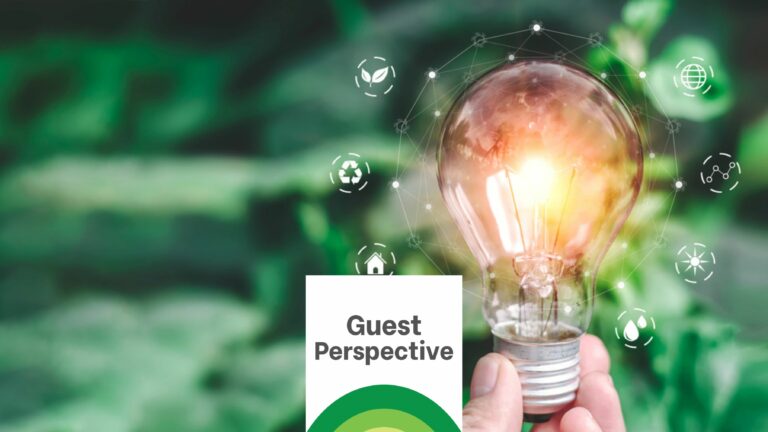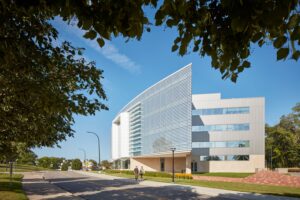
Britany Affolter-Caine, Executive Director of URC Shares Insight on the Impact of Higher Ed on Sustainability Efforts

BRITANY AFFOLTER-CAINE, IS THE EXECUTIVE DIRECTOR OF MICHIGAN’S UNIVERSITY RESEARCH CORRIDOR
Students and young adults see climate change and the preservation of our planet not as an impending challenge, but one with grave consequences that are impacting humanity today. Generation Z is more likely than older generations to act on their climate concerns through their purchasing power and in career choices. A majority of Gen Z are willing to spend 10% more money for sustainable brands according to a 2019 McKinsey report, and 42% of Gen Z respondents have already changed or plan to change their job or industry due to climate concerns according to a 2023 Deloitte survey. For these future leaders and doers, the greatest priority is to develop sustainable solutions to mitigate these impacts and the forces causing further environmental harm.
Gen Z is not alone. Many university researchers, staff and administrators across Michigan’s University Research Corridor (URC) share their climate concerns and have made sustainability a priority area of research, education, innovation and service. An alliance of Michigan State University, the University of Michigan and Wayne State University that is dedicated to improving the quality of life for its region while advancing knowledge at a global level, the URC is committed to bringing all its resources to tackling climate change and mitigating its impacts today and in the future.

Sustainability is an imperative we define as efforts to discover ways to meet the economic and health needs of people today while meeting the needs of future generations to thrive in ways that are effective, just and equitable. Sustainability includes decarbonization, clean energy innovation, reducing waste and pollution and managing limited resources, such as water. The sustainability work of URC researchers and students stretches across dozens of academic fields and within dedicated schools and colleges, such as U-M’s School for Environment and Sustainability, and includes partners in our communities, government and industry. Development of sustainable technologies, knowledge and practices is critical for addressing climate change and is good for our economy.
For example, Michigan’s mobility sector is accelerating its transition to a more sustainable and eco-friendly industry. It is reshaping the way people think about transportation, pushing automakers to innovate, and encouraging governments and businesses to invest in a cleaner future. The URC universities play a key role in developing new technologies to support the mobility industry’s transition. Over the past five years, Michigan’s URC universities conducted more than $565 million in mobility-related R&D, which included sustainability-focused research, such as light weighting vehicles through advanced materials, energy storage to extend battery range for vehicles and alternative fuels that are more sustainable, such as hydrogen.
The contributions our universities are making to support sustainability in the market can be seen in our strategic innovation partnerships with industry, like at MSU’s top-ranked School of Packaging, where researchers are working alongside industry leaders to reduce the amount of plastic waste in landfills and water systems by streamlining the different types of plastics that are used in manufacturing.
MSU is also a leader in mass timber research, studying everything from structural performance and cost savings to fire resistance and sustainability. Made from a renewable resource, mass timber stores carbon and is less carbon-intensive to produce than other common building materials.
U-M’s BioMatters team has developed their own sustainable solution for construction using upcycled sawdust. This fully biodegradable, reusable and recyclable material is formed into molds using 3D printing and can replace concrete formwork traditionally used across the construction industry. These molds are like giant LEGO pieces that can be used again and again.
At a time when the consequences of climate change are increasingly evident and devastating, the need for sustainable solutions across all sectors has never been more urgent. This starts on our own campuses, where we all have implemented comprehensive sustainability initiatives that encompass various aspects of campus life. We’ve invested in energy-efficient infrastructure, adopted renewable energy sources, and reduced greenhouse gas emissions through innovative technologies and conservation efforts, showing that the URC is not only contributing to a greener Michigan but also setting an example for institutions nationwide.
From lead in drinking water and intergenerational impacts of pollutants to mitigating development of fatbergs in our wastewater systems to storm water management, Wayne State has been studying the impacts of climate change and environmental threats to human health on residents and communities in Michigan’s largest city, Detroit. Old pollutants left behind by factories and other industries in the past are causing problems for people and the environment today. Supported by an $11.5-million National Institutes of Health grant, Wayne State University’s Center for Leadership in Environmental Awareness and Research is studying these old pollutants in cities, identifying how they move around and their impact on the health of mothers and babies.
Our commitment extends to our work in sustainable action in communities across Michigan and the world. Michigan is renowned for its abundant freshwater resources, including the Great Lakes, which contain about 20% of the world’s surface freshwater supply. The presence of these vast water bodies makes our institutions leaders in research on water-related issues and solutions.
The United Nations tapped Wayne State University and the University of Windsor to head its Regional Centre of Expertise on Education for Sustainable Development in the Detroit-Windsor region. The partnership will address community health, equitable city-building practices, public transportation, clean water, sustainable urban planning and housing policy, to better our two communities that share an international border.
U-M recently received a $5 million grant to study how climate change is affecting water resources in different areas, especially when those areas share borders. This research will help us understand how rising temperatures and changing weather patterns are impacting our water supply, like rivers and lakes, and lead to better ways to manage and protect these vital sources of water.
Sustainability is already becoming the heart of academic and industry research. Not only are environmental and economic pressures mounting, but our next generation of thinkers and leaders are dedicating their lives to addressing these issues. Sustainability is a thread that runs through every field in one way or another.
Today’s young people are experiencing a rise of eco-anxiety, a chronic fear of environmental doom recognized by the American Psychology Association. If my generation had a fear of nuclear annihilation having come of age during the height of the cold war, Gen Z has had to bear witness to climate change impacts with devastating consequences across the world and in their backyards. Engaging in sustainable practices – finding agency – is a way to combat feelings of powerlessness. Regardless of major, sustainability is becoming an important piece of students’ education.
The National Sustainability Society, a cross-sectoral professional society of university faculty and partners from across the U.S., is focused on institutionalizing sustainability as a coherent, transdisciplinary scholarly field in research and in the classroom. Members from all three URC universities engaged in the inaugural event in Ann Arbor and hosted by U-M’s SEAS to codify the effort and direction of sustainability curriculum development, education and workforce development and co-designing sustainability solutions in October 2023. Members will continue to work to further the integration of sustainability across the disciplinary spectrum to benefit the educational and research aims of students and faculty with respect to sustainability.
Climate change and its current and long-term threats to people and economies across the globe may be our greatest existential threat. Developing sustainable solutions through research, innovation, education and service are critical priorities for the URC universities and our partners. We will continue to do the work, making a difference where we can. It is the vital role research universities can and must play.
Be sure to subscribe to our newsletter for regular updates on sustainable business practices in and around Detroit.
Guest
- All
- Business
- Community
- Education
- Events

ZF Group, a global technology company with its North American headquarters in Northville, specializes in systems for passenger cars, commercial vehicles, and industrial technology. With a focus on next-generation mobility, the company develops solutions that address electrification, automation, and digitalization while aiming to improve safety, efficiency, and sustainability in transportation. SBN Detroit interviewed Anuj Shah, Sustainability Lead, for the Americas, to explore the most pressing environmental challenges in...

The Chip Bag Project, based in Detroit, is a sustainability initiative that upcycles hard-to-recycle snack packaging — particularly chip bags — into insulated sleeping bags for individuals experiencing homelessness. Founded by Eradajere Oleita, the project addresses both environmental waste and housing insecurity by transforming materials like Mylar into practical, thermally efficient solutions. In June, Oleita was among Trelllis’s 30 Under 30, its annual recognition of the brightest young...

PowerPanel, headquartered in Oxford, focuses on sustainable energy technology with a particular emphasis on hot water systems and thermal energy capture. The company designs and manufactures modular solar hybrid systems that integrate both photovoltaic and thermal components into a single unit. Its goal is to offer energy solutions that are more efficient, durable, and economically viable for a range of commercial and industrial applications. SBN Detroit interviewed Garth...







